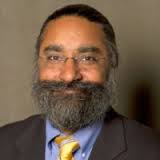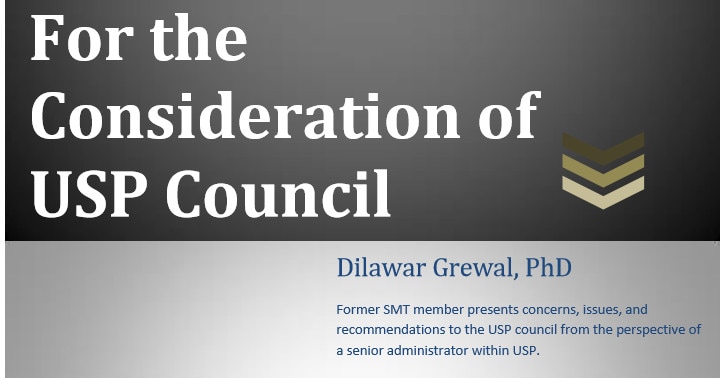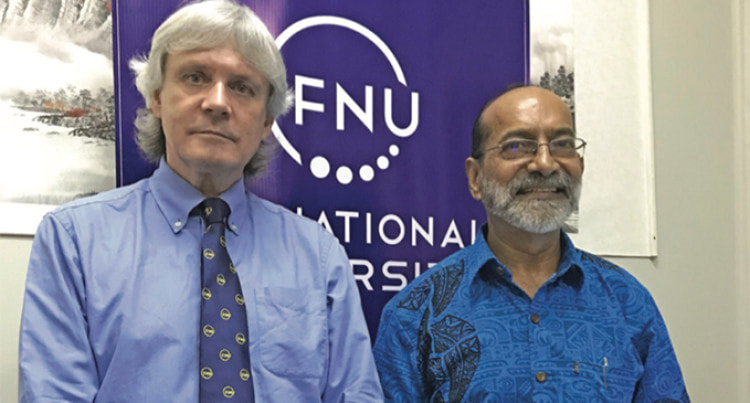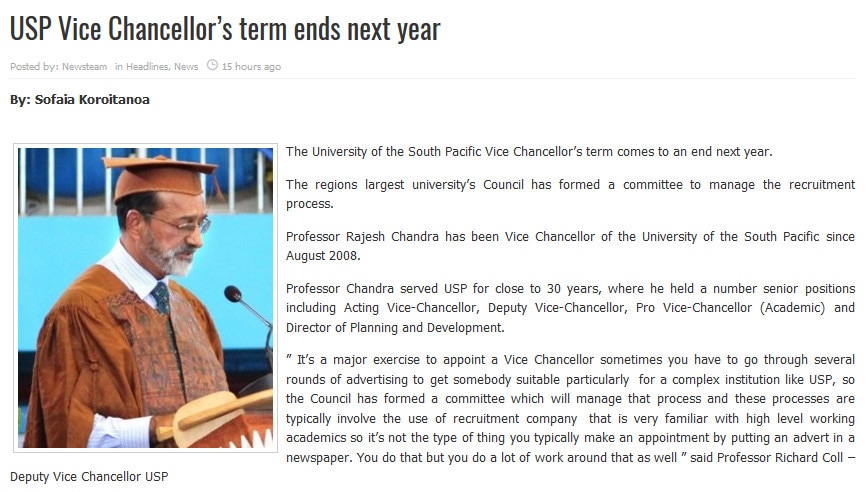"We were not able to obtain comments from Rajesh Chandra, the Vice-Chancellor and President of USP nor the "TOPPER" Minister of Education Mahendra Reddy for both have a contemptuous dislike of Fijileaks. The Fiji media are no better, refusing to follow up on Fijileaks postings, to hold power, politicians, and individuals to account"
"There are many issues that do not come to your attention due to the control on communications with Council members that the Administration exerts, and also because of the culture of fear and silence at USP. However, the information I provide in this email to you is an honest attempt at due diligence by me as an ex senior administrator at providing a side of the picture to the Governance of USP that would not easily get to them. Most of the information in this email is about USP processes and practices that are detrimental to USP, its future, and its staff and students. I have included not only issues for your consideration, but also recommendations to address the same. The second section in this document specifically addresses certain leadership issues that have a significantly higher impact on how USP is perceived, the morale of staff and the future state of the university. For this section I will not be providing any recommendations; it is up to Council to decide how it wishes to deal with these specific issues." Dr Dilawar Grewal
"USP clearly is cloaked in a culture of fear and silence because influence trumps process at USP."
"A senior administrator can be fired in complete violation of policy, law and ethical standards for personal friendships and sharing his non-confidential performance report. Yet, a staff member can come to work drunk, harass people, utter obscenities on a microphone at a public meeting in presence of the VCP, another can have a litany of sexual harassment reports with HR by different people, and nothing happens. What is common in the outcome of all these cases? Simply, influence peddling by someone powerful"
 Dr Grewal
Dr Grewal 1. Leadership
Leadership at every renowned university, every excellent university, is entrenched in sharing of ideas, academic freedom and established best practices. Even charismatic leaders surround themselves with thought leaders in various specialties and listen to their voices. If a single leaders’ voice were the only thing that matters in all decisions, at all levels, then why bother hiring senior managers?
Why not save money and just accept the voice of one person as the only voice that matters? If you look at how USP is run, there is very little power distribution, hence accountability across the spectrum. The University should espouse an environment and protocols that prevent any person, including the person in the VCP position, from assuming and exerting absolute control.
A student does not like the grades he/she gets, they go straight to the VCP and the VCP may intervene in certain cases and not others. Who gets hired as a HoS in any faculty and how long he/she stays has a direct correlation with what the VCP desires. It is not common at SMT meetings to see open acceptance of diversity of thought. Most often it is a place where the Senior Managers are either told what VCP wants them to do or reprimanded for not doing the bidding of the VCP.
There is a huge difference between difference of opinion and insubordination. Diversity of views is not detrimental to the institutional health, it is necessary for a healthy system. Power and decision making rights (appropriate for each level) should be distributed and respected at all levels. A unilateral decision making structure is not an efficient organizational structure, irrespective of who the leader is at the helm of the institution. It also generates a culture of fear. USP clearly is cloaked in a culture of fear and silence because influence trumps process at USP. Some examples of why this particular type of leadership is risky for the University:
At a strategic level – A very profound decision was made somewhere and by someone that the University will focus heavily on developing vocational studies and training as a strategy, rather than concentrating on developing advanced tertiary education and research programs. No open debates were held on the topic, no faculty discussions, not even a committee of stakeholders and experts to lend a voice. One step led to another, one decision to another, and the ensuing result is that now PTAFE is nearly the largest department/faculty on campus. The number of professors in the faculties is steadily declining, the research infrastructure is not growing, the number of teaching hours is dropping, PhD staff in faculties are getting paid less than people without postgraduate qualifications in PTAFE . Programs in faculties are being slashed, while programs in PTAFE are growing exponentially. Development of PTAFE could be good as it generates money USP desperately needs. However, PTAFE income is not being used to bolster the academic areas. PTAFE keeps its money. So the question arises, in another few years what will USP be known for – cooking classes or climate change research, and more importantly is that a decision that has been collectively made for the future of USP?
At an operational level – The University has a well-defined organizational structure. But is this structure functional? The University has policies and procedures, but they are trumped by personalities and positions quite often. Executives use privilege to circumvent, adapt or selectively apply policy and procedure to get results they desire, rather than as an extraordinary intervention for which they can be held responsible.
Examples include: HR disciplinary actions are heavily dependent on dictums rather than process. There is a committee that decides on staff development matters, however, for the well connected you can travel the world without ever having to compete for those staff development funds. You compete for a budget allocation and get it, but then never see the money or the EDF can remove it without informing you or your line SMT because the EDF claims VCP decided to use it elsewhere. Your departmental plans can suddenly cease to matter, but you still will be held responsible for the outputs. Effective leadership is not the word that comes to mind when describing these situations at USP. Interventions such as these weaken existing institutional processes, make people jaded, which in turn weakens the institution.
Successful and excellent organizations do not allow personal power to subvert the power of organizational policies, procedures and ethics.
At a personal level – The administrative culture at USP is who you know, are in favor with, and not what you know. A senior administrator can be fired in complete violation of policy, law and ethical standards for personal friendships and sharing his non-confidential performance report. Yet, a staff member can come to work drunk, harass people, utter obscenities on a microphone at a public meeting in presence of the VCP, another can have a litany of sexual harassment reports with HR by different people, and nothing happens. What is common in the outcome of all these cases? Simply, influence peddling by someone powerful. Successful and excellent organizations do not allow personal power to subvert the power of organizational policies, procedures and ethics. Consistent processes and fair practices are the bedrock of stability at any organization, not personal generosity or personal vendettas.
Ramifications. Excellent universities do not get sued at the rate USP does. There must be a reason why USP gets sued so much. One of the reasons lies in the simple fact that organizational policies and procedures are trumped with impunity.
It is to USP’s benefit to break the wall of silence
Leadership Recommendations:
Open communications channels. Every organization has a gap between Governance and Operations/Administration. USP has deliberately constructed an impermeable wall of silence. All communications to and with the Council are strictly controlled and manipulated by the VCP office and the Marketing office. The only picture that Council gets is what the VCP wants Council to get. Senior administrators are emphatically discouraged, if not directly disallowed, from direct communications with the Council. Remove this artificial barrier. Simple solution, allow DVCs, VPs and Deans to have direct sessions with Council members.
Council should have certain standing committees that are not chaired by the VCP. The VCP gets to establish his story line with the Council by being in direct contact with them and by controlling all communications with the Council. The Council, like any responsible body, should also have alternate sources of information that are not based on hearsay. Having standing committees where the VCP is not a member presents the opportunity for Governance to verify the Administration’s story and claims, whether they come from the VCP or from other members of Administration.
Establish fair policies and procedures that are applicable to all. Council has shifted the power base towards the VCP position to an extent that it is at the brink of becoming absolute. Examples include not entertaining any anonymous complaints against the VCP, yet the VCP entertains anonymous complaints against staff at his pleasure, even circumventing established procedures: Result is absolute power with the VCP. USP does not have a whistleblower policy. Council members are not easily accessible. Common people cannot even get a contact list of Council members for this public institution. Grievance procedures either do not exist or are very weak and easily ignored. So where does that leave an ordinary member of staff when they genuinely have an issue? Either VCP should be banned from entertaining anonymous complaints against staff members or Council should also entertain anonymous complaints against the VCP. Fairness should be obvious at all levels and not only at some levels.
Open Sessions. Have an open session during Council meetings where any staff member can come and present issues, both good and bad, that they wish to share with the Council. Universities are not supposed to be these closed, secretive, punitive places. The very essence of a university is based in openness, discovery and sharing of ideas. An open session would provide a link between Governance and staff, thus presenting an opportunity for a stronger relationship of sharing, common good, and accountability between Governance, Administration and the university community (staff and students). Right now, administration controls all access and every word that is presented to Council, good or bad.
Strengthen governance and oversight. Council should strengthen the collective control over the future direction of the University. It is entirely too risky to allow one person to determine the future of the University. The VCP as the Chief Operating Officer is in charge of making sure that the future of the University is secure and that the processes and personnel will get it there. The COO is not the sole determining officer when it comes to deciding the future of the University. The VCP has open forums that are useful in sharing his views with the staff and students and listening to them. Governance, as the ultimate body responsible for the future of the University should also hold open forums with Staff, students and stakeholders to hear their views on current status and the future of the University.
To be continued





